 This article is part two of the interview with Shaka Gonzalez Brown in honor of the Capital Congress Latin Dance Festival. Part one of the interview discussed Shaka’s: background, the golden age of Washington DC’s Salsa scene, and some of the inspirations for his own social dancing style. Part two will discuss: the current state of salsa, the rise of other Latin dance styles, and the Capital Congress. The pictures used in this post were once again graciously shared by Shaka himself.
This article is part two of the interview with Shaka Gonzalez Brown in honor of the Capital Congress Latin Dance Festival. Part one of the interview discussed Shaka’s: background, the golden age of Washington DC’s Salsa scene, and some of the inspirations for his own social dancing style. Part two will discuss: the current state of salsa, the rise of other Latin dance styles, and the Capital Congress. The pictures used in this post were once again graciously shared by Shaka himself.
Anwar Dunbar: When I started dancing in 2002, Salsa reigned supreme, but then around 2007, Bachata ascended, and then Kizobma and Zouk.
Shaka Gonzalez Brown: They just kept coming up with things to take over from salsa (laughing).
AD: Yes, so you had these other universes coming up. How are things now? You started teaching some Kizomba yourself right? What is the state or balance now of the Latin dances?
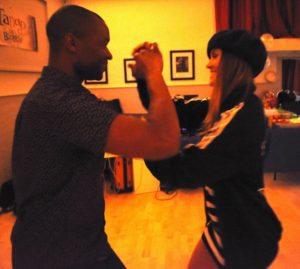 SGB: How things now? Well, Salsa used to be the main dish. I was talking to a buddy and he said, ‘Salsa is my steak, and the Bachata is like some mashed potatoes, and one of the other dances might be like some vegetables, but I have to have my steak you know?’
SGB: How things now? Well, Salsa used to be the main dish. I was talking to a buddy and he said, ‘Salsa is my steak, and the Bachata is like some mashed potatoes, and one of the other dances might be like some vegetables, but I have to have my steak you know?’
So that was the case for a long time. Bachata and Kizomba are easier dances, so it’s easier to reach the masses. To dance Salsa, it sounds weird to say this – it can be hard and it can be really discouraging for someone. So you have a personality type that wants to learn it, and is going to go into something that’s hard, and they really don’t care about it being discouraging because they have a bigger goal. But there are other people who say, ‘I just want to have fun, and salsa is too complicated.’
So in terms of dealing with that, the instructors, the teachers, and the artists are the ones who have a big responsibility in terms of making it fun as people are on the path, because if you’re discouraging someone who is just starting out, they’re going to find something else to do where they feel more welcome. It’s important to let people know that, ‘You know you’re at this point now, but there’s something to enjoy about being at this point, and we’re going to be with you all of the way whether you’re an advanced dancer or just a beginner.’
I’ve seen this – the schools and the instructors that are able to build the best scenes are the ones who are open and welcome. If you look at folks like Ismael Otero of Caribbean Soul, he’ll have dancers who come in who know nothing from their first day of class, but they know they like the environment and they know they like hanging out with him. As long as you hang out with somebody you’re going to pick up their habits, and you’re going to pick up their touches.
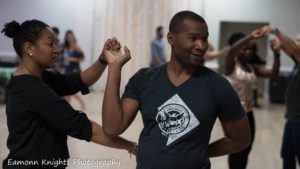 So as the student you say okay, ‘This group of people, I’m going to dance with everybody, they’re friendly and they might be good and they might not be that good, they’re just learning but they’re all a group,’ and that’s what people want to be a part of. They want to be a part of something, so with the Bachata and the Kizomba, the basic steps are pretty simple so there’s not a big range in terms of this person has been doing this for one month, and this person has been doing this for six months.
So as the student you say okay, ‘This group of people, I’m going to dance with everybody, they’re friendly and they might be good and they might not be that good, they’re just learning but they’re all a group,’ and that’s what people want to be a part of. They want to be a part of something, so with the Bachata and the Kizomba, the basic steps are pretty simple so there’s not a big range in terms of this person has been doing this for one month, and this person has been doing this for six months.
That six month person can easily dance with that one month person, and still make them feel like they’re doing something, whereas the Salsa can be so exclusive, because as you mentioned, you can get to the social or party and say, ‘I want to dance with the person who has been dancing for five years,’ but they’re going to be so much better than the person who has only been doing it for two weeks, and that two week person could be standing there like, ‘Okay I just spent my money, dressed up, came out and now I’m just standing here not doing anything.’ Then they can go to the Bachata room and someone will grab them and say, ‘Oh you’ve been dancing for two weeks? You’re fine,’ and then they’ll be dancing all night. So it’s how that system is managed that’s really going to determine what happens with the Salsa scene, because people have more options now.
AD: I experienced that firsthand when I moved to Albany (the Capital Region Salsa Social). I did some low level teaching and tried a little bit of DJing as well; both more challenging at times than they look. I wanted to bring Salsa to the area the way that you guys did it, and it just didn’t take. Likewise I witnessed a bunch of people gravitate towards Bachata, and then Kizomba. I just didn’t understand what was going on at the time but you’re right. It’s a very interesting phenomenon.
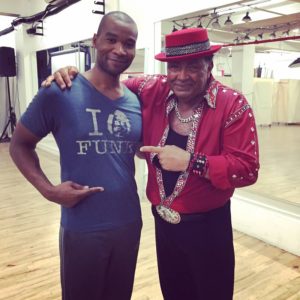 SGB: And because folks are on different paths sometimes, even when a person says, ‘I want to be a DJ,’ they may want to DJ because they have music that they like. I was talking with Lorenzo Haire (DJ Renzo), and we talked about how there is a difference between a DJ and music collector. A music collector is going to have music that they like, so they’ll say, ‘I’m going to play something that I like and hope that you’ll like it,’ whereas a DJ will ask, ‘What is it that I can do with this crowd?’
SGB: And because folks are on different paths sometimes, even when a person says, ‘I want to be a DJ,’ they may want to DJ because they have music that they like. I was talking with Lorenzo Haire (DJ Renzo), and we talked about how there is a difference between a DJ and music collector. A music collector is going to have music that they like, so they’ll say, ‘I’m going to play something that I like and hope that you’ll like it,’ whereas a DJ will ask, ‘What is it that I can do with this crowd?’
Renzo said the same thing. He said, ‘I don’t make up playlists. I get to the venue, start playing a song, and see how it works. If that works then I’ll work with that, but you don’t come with a full playlist of everything you’re going to play regardless of the people that are there.’ So when you have someone who says, ‘This is the music that I like, and you guys need to like it as well, and this is the only thing I’m going to play for you,’ it can turn people off. Some people might want to hear some Salsa Romantica, some Marc Anthony, some Bachata – do something to draw me in not push me away.
AD: That’s right and I was guilty of that. People definitely have different palates in terms of music and it’s a lot like eating a meal.
So Shaka on that same vein, when I first started dancing in Detroit (the YA Social), I didn’t organize any of the events, so I was unaware of what goes into: starting socials, coordinating with other studios, and building up relationships with other instructors, and I was oblivious to all of the behind the scenes stuff. I got a lot of exposure to that when I moved to Albany where I saw the politics that go on, the business side of dancing, the rivalries, and all of those unpleasant things. Describe your transition from being a student, to an instructor/performer, to a promoter.
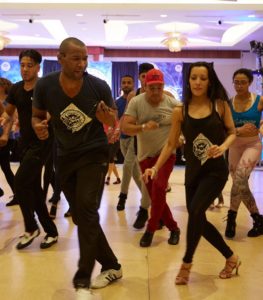 SGB: Everything is a transition and an adjustment – like when you go from being the guy who goes out and dances to the guy who teaches, people will look at you through a different lens. There are folks I know who I see when I go out, and we chat it up each time we’re at a party. Our relationship is seeing them at the club and they have fun when they’re dancing. But if they tell me, ‘Oh I’m teaching over here, here, and here now,’ now I’m thinking, ‘Whoa wait a minute what’s your goal there?’ Now I just don’t look at you and see how you dance, but technically how you dance.
SGB: Everything is a transition and an adjustment – like when you go from being the guy who goes out and dances to the guy who teaches, people will look at you through a different lens. There are folks I know who I see when I go out, and we chat it up each time we’re at a party. Our relationship is seeing them at the club and they have fun when they’re dancing. But if they tell me, ‘Oh I’m teaching over here, here, and here now,’ now I’m thinking, ‘Whoa wait a minute what’s your goal there?’ Now I just don’t look at you and see how you dance, but technically how you dance.
Are you just having fun? Do you know what you’re doing? Are you able to communicate that to people and teach that? I don’t want to say you look at the person as less, but you are way more critical of what they’re doing and if they haven’t taken that into account, then that can be a turnoff for me, just like if I was to suddenly promote myself as a Salsa DJ. I mean I’ve been in this thing for 15-16 years, but I know that I am not a DJ. If I tell people I’m a DJ, the DJs I respect are going to hold me to the flame. If you’re a DJ, can you handle this situation? Can you handle that situation? And I realize, no I can’t handle that situation so why am I calling myself a DJ?
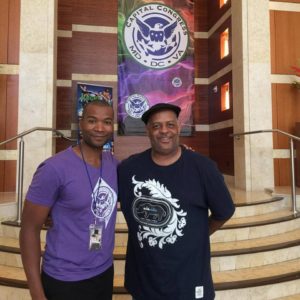 So it’s the same thing with being a promoter. I’m much more of a dancer than I am a promoter because when I see folks actually promoting, I think, ‘I should be doing that.’ They’re the ones handing out flyers and talking to people, pushing people and just constantly promoting, and promoting and promoting. That’s the job of a promoter and so on. Each time you want to wear a new hat, you want to make sure you’re willing to go through what it takes to be that, or else you’re not being fair to yourself.
So it’s the same thing with being a promoter. I’m much more of a dancer than I am a promoter because when I see folks actually promoting, I think, ‘I should be doing that.’ They’re the ones handing out flyers and talking to people, pushing people and just constantly promoting, and promoting and promoting. That’s the job of a promoter and so on. Each time you want to wear a new hat, you want to make sure you’re willing to go through what it takes to be that, or else you’re not being fair to yourself.
AD: So sometimes you have dancers who say, ‘I want to teach. I want to start a school. I want to host my own event.’ The short version of it all is that there is a lot that goes on behind the scenes when you transition from social dancing to the promoting, and the event organizing.
SGB: Every single one of those aspects is a very separate job, and you don’t need to be the do all person. If you’re just good at one particular thing, that’s going to rise. If I try to do everything and say, ‘Oh I can teach. I can promote. I can DJ. I can create flyers. I make my own t-shirts and I can bake cookies,’ then it’s like, okay which one of these things are you really going to do? If you’re average at everything and not doing one thing well, then you’re just that; average. You want to be great at something.
AD: So now Shaka, talk about the Capital Congress.
 SGB: We started it in 2005 and it came out of a house party we used to do back in 2002 and 2003. We had a big apartment, my friend Dupree and I, with wood floors, and we said, ‘Why don’t we do a house party?’ I was much more of a promoter then because I would send out these long emails. They were funny and they were dramatic. It was just me trying to get people to come to the party. We must have done about six of these parties and we had people flying in from Chicago, coming from North Carolina, coming in from New York, just for these house parties. And so a promoter, my buddy the late David Melendez saw what I was doing with these parties and said that he wanted to do a Salsa Congress in DC. And so I told him, ‘I’m not a promoter,’ and he said, ‘No just do what you normally do,’ and that’s what we did for the Salsa Congress.
SGB: We started it in 2005 and it came out of a house party we used to do back in 2002 and 2003. We had a big apartment, my friend Dupree and I, with wood floors, and we said, ‘Why don’t we do a house party?’ I was much more of a promoter then because I would send out these long emails. They were funny and they were dramatic. It was just me trying to get people to come to the party. We must have done about six of these parties and we had people flying in from Chicago, coming from North Carolina, coming in from New York, just for these house parties. And so a promoter, my buddy the late David Melendez saw what I was doing with these parties and said that he wanted to do a Salsa Congress in DC. And so I told him, ‘I’m not a promoter,’ and he said, ‘No just do what you normally do,’ and that’s what we did for the Salsa Congress.
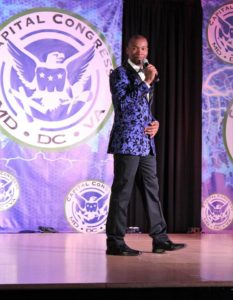 That started in 2005, and David passed away in 2007 and I continued doing the event since then. First when I moved out to Portugal and to Miami, it was like a homecoming. For me each year I was like, okay I’m coming back and doing this event which is an opportunity for everyone to be under one roof and of all different skill levels, and all different dance types, and to have access and to be able to learn from the best instructors in the world because they’re all there, and they’re available to interact. I think it’s like you mentioned, it’s important for the instructors to be available so a beginner can come up to them and have the same chance to get a dance as the most advanced dancer. Also the best instructors I know like teaching beginning classes because sometimes we think that the best instructors are going to be teaching the advanced classes.
That started in 2005, and David passed away in 2007 and I continued doing the event since then. First when I moved out to Portugal and to Miami, it was like a homecoming. For me each year I was like, okay I’m coming back and doing this event which is an opportunity for everyone to be under one roof and of all different skill levels, and all different dance types, and to have access and to be able to learn from the best instructors in the world because they’re all there, and they’re available to interact. I think it’s like you mentioned, it’s important for the instructors to be available so a beginner can come up to them and have the same chance to get a dance as the most advanced dancer. Also the best instructors I know like teaching beginning classes because sometimes we think that the best instructors are going to be teaching the advanced classes.
Sometimes as an advanced dancer, you know how to get the concepts a person is trying to teach whether they’re teaching it well or not. But it’s to the beginner dancers whom you say, ‘Okay let me show you the most important aspects of what you’re doing,’ and getting that guidance from one of the top five dancers in the world, who will say, ‘Let me show you guys two things that if you get these, you’ll be able expand yourselves and take your dance to new level,’ instead of saying, ‘Oh these are the beginners. Let anybody teach them. All we’re going to do is walk back and forth and do right turns.’
There are so many ways you can grow a scene by having the right people – by having that right fertilizer for it. For me that’s what the Congress is. I know it goes well when I can put everybody in the room and just leave and know that folks are going to have a good time and that there’s not going to be any weird drama. There’s not going to be people turning down other people. That to me is the joy of the event. That’s the best part.
AD: So a Congress (in the dance context) is essentially a weekend of: dance workshops, shows-.
SGB: It’s workshops, parties, performances – and you know it’s a Latin dance experience.
AD: And it looks like you guys have expanded it to incorporate: Bachata, Zouk, and Kizomba.
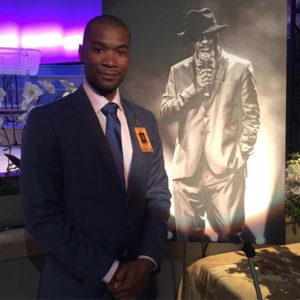 SGB: Well it’s the same thing; I don’t want just steak. I want the steak, the mashed potatoes, and the vegetables. I want everything to come together at the middle of the pot. My focus is making sure Salsa doesn’t end up as the back burner-type thing. I live in Miami and outside of my window, they have the Ultra Music Festival. It’s hundreds of thousands of people all in one place, and as an event organizer, I think to myself, ‘Oh it would be great to have something like that,’ but as a Salsero I think okay there aren’t that many Salseros, and if I had that many people, I would not be able to cater to what it is that I love. I would not be able to have just David Gonzalez, Hector Martinez and Frankie Morales that I can just text and talk to on Facebook and say, ‘This is what we’re going to do. We’re putting this kind of sound together and we’re going to do the old Tito Puento version of this with him playing this,’ and knowing that’s an experience unlike any other.
SGB: Well it’s the same thing; I don’t want just steak. I want the steak, the mashed potatoes, and the vegetables. I want everything to come together at the middle of the pot. My focus is making sure Salsa doesn’t end up as the back burner-type thing. I live in Miami and outside of my window, they have the Ultra Music Festival. It’s hundreds of thousands of people all in one place, and as an event organizer, I think to myself, ‘Oh it would be great to have something like that,’ but as a Salsero I think okay there aren’t that many Salseros, and if I had that many people, I would not be able to cater to what it is that I love. I would not be able to have just David Gonzalez, Hector Martinez and Frankie Morales that I can just text and talk to on Facebook and say, ‘This is what we’re going to do. We’re putting this kind of sound together and we’re going to do the old Tito Puento version of this with him playing this,’ and knowing that’s an experience unlike any other.
There aren’t hundreds of thousands of people who will come for that, and I don’t care about that. I want to have that two thousand people come together and have that experience of seeing the New Swing Sextet, and seeing Terry and Cécile. One of the biggest joys for me last year was that I did my first performance to a New Swing Sextet song, and to have the New Swing Sextet last year at my congress say, ‘Hey I want to dedicate this song to Shaka,’ and I said, ‘What?’, and they played that song and I was able to dance to it. That for me is the magic of the event and the most important thing is saying, ‘This is Salsa. This is Latin music.’ The other stuff, I can get that anywhere.
AD: Okay Shaka I’ve got three more questions. Running a congress, what has it taught you?
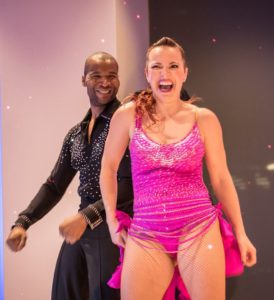 SGB: In terms of organizing a congress? – finding people who are much better at their jobs than I am. I’ve also learned to hire the best people to: manage the dance floors, the sound, the installation, and manage the DJs. Each one of those tasks, I would tell myself, ‘Oh yeah I can do that task,’ but having to do all of those tasks is overwhelming and I learned that each time I find the right person that I can delegate to, then I find that life becomes so much more – Well maybe you even get a chance to dance at your own event. So I’ve learned that you go professional for as much as you can. If you do anything halfway, then you get halfway results.
SGB: In terms of organizing a congress? – finding people who are much better at their jobs than I am. I’ve also learned to hire the best people to: manage the dance floors, the sound, the installation, and manage the DJs. Each one of those tasks, I would tell myself, ‘Oh yeah I can do that task,’ but having to do all of those tasks is overwhelming and I learned that each time I find the right person that I can delegate to, then I find that life becomes so much more – Well maybe you even get a chance to dance at your own event. So I’ve learned that you go professional for as much as you can. If you do anything halfway, then you get halfway results.
AD: The last two questions are related to performances. So the original performance you did with Psyon Mauricio Scott; the famous two man routine, is that available anywhere? Is it on YouTube? Or is it locked away in a vault somewhere?
SGB: If you find it let me know (laughing). I have some halfway versions of it but – this was before YouTube even existed. I think I have one version somewhere, but I would like to see it so that I can go and re-learn it and do it somewhere. We danced to “El Presidente Dante” by Frankie Dante Y Su Orquesta Flamboyan. I first heard that song when DJ Bruno played it at Clarendon Grill. But in terms of performances, that is important to me for people to know what song we’re performing to, and who did it and what version, because you have a lot of folks who just start doing it without knowing what they’re doing and why. So we push that on our teams and say, ‘You guys need to know the music we’re dancing to,’ because one of the most embarrassing things for me is to have a dancer on my team who doesn’t know the song we’re dancing to.
AD: The last question; the five man musical chairs routine you did at the Flava Invasion with Pyson Mauricio Scott, Gordon Neil, Sekou McMiller and Leon Rose, is it true you guys put that together in 10 minutes? One of them told me that.
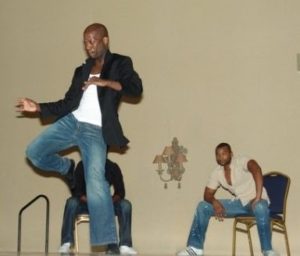 SGB: That routine, we had no idea what we were doing for that routine (laughing). Gordon said he wanted us to do a routine, and we got together in the middle of the Flava Invasion, and we went over to Gordon’s house. He said, ‘I’m thinking we’ll use this song’ (The Hustler by Willie Colon). We counted out the eight counts in the song and realized there were five sections that we could use. And then the chorus so to speak – that horn riff that comes in, we said, ‘Okay that repeats, so we can all do the same thing for that chorus, and then in between, each person will just free-style.’ And then we decided that when we brought each person up, we’d just rotate the chairs. So we did that, and we kind of just listened to it, said okay that works, and then we all left. We had a specific cut of the song we were going to use, so right before we’re about walk onto the stage, Gordon says to me, ‘Oh we’re going to use the whole song,’ and I said, ‘What?’
SGB: That routine, we had no idea what we were doing for that routine (laughing). Gordon said he wanted us to do a routine, and we got together in the middle of the Flava Invasion, and we went over to Gordon’s house. He said, ‘I’m thinking we’ll use this song’ (The Hustler by Willie Colon). We counted out the eight counts in the song and realized there were five sections that we could use. And then the chorus so to speak – that horn riff that comes in, we said, ‘Okay that repeats, so we can all do the same thing for that chorus, and then in between, each person will just free-style.’ And then we decided that when we brought each person up, we’d just rotate the chairs. So we did that, and we kind of just listened to it, said okay that works, and then we all left. We had a specific cut of the song we were going to use, so right before we’re about walk onto the stage, Gordon says to me, ‘Oh we’re going to use the whole song,’ and I said, ‘What?’
So we’re all up there (laughing), and if you see us, we’re all counting the song throughout the chorus and looking at each other. Our plan was that we would stomp so that the other person would know that they were cued up. So you see us all just standing there – you might even see our lips moving, and then at one point in time we stomp, and if the person was off on the stomp, then they would know, because everyone else was stomping. You’d say, ‘Oh this is where we are so now it’s my turn to go out there. ‘That was a lot of fun in terms of how random and spontaneous it was. We all said, ‘We have to make it through this song.’
AD: Okay, because the end result was brilliant, especially when you did that flip (laughing).
SGB: Oh god. That flip – I can tell you why I did that flip, because I was thinking, ‘I can do a backflip,’ when it was my turn to go up, but Leon went before me, and Leon did a backflip and then I thought, ‘Okay now I have to come up with something else now,’ At the same time I’m counting and stomping and trying to remember when I have to go up, so I said, ‘Okay I’ll do a front flip.’ So I did a front flip and you might notice that I didn’t land on my feet. I landed on my back.
So I do the front flip, land on my back, and then I kept dancing and my back was killing me, and as I walked off of the stage, I’m texting my chiropractor (laughing) and saying, ‘Okay I’ve got to see you on Monday.’ But yes I thought I was going to break my back out there, and there was something that happened with Gordon – he was doing his free-style, and he grabbed his foot as he was spinning around, and afterwards I asked him, ‘Did you just grab your boot?,’ to which he said, ‘I was feeling it (laughing).’ That was the fun of the Flava Invasion that year. There’s a story behind everything if you get to watch that show again.
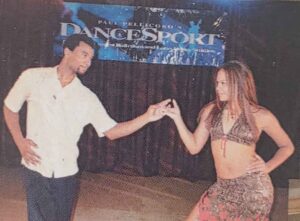
AD: Yes when I saw it, I was trying to show it to everyone and telling everyone how great it was.
Well Shaka thank you again for this amazing interview. We covered a lot. Thanks for helping me get through graduate school, your teaching and your inspiration, and even for sharing some music files here and there over the years. I look forward to seeing you and everyone else at the Capital Congress this year in June.
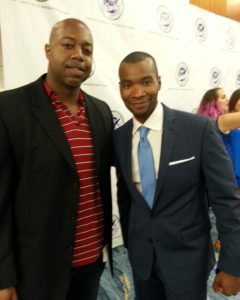 SGB: Okay thank you Anwar. I loved being a part of this, and I’ll see you at the Congress.
SGB: Okay thank you Anwar. I loved being a part of this, and I’ll see you at the Congress.
To learn about the stellar schedule of workshops, and performances Shaka Gonzalez Brown and his team have put together, visit the Capital Congress website.
Thank you for taking out the time to read this interview. If you’ve found value here and think it would benefit others, please share it and/or leave a comment. You can follow me on Twitter at @BWArePowerful. Lastly, you can follow me on Instagram at @anwaryusef76.
A Quick Plug for My Book
Hello. Thank you for clicking on this link, and I hope you enjoyed this interview. Writing a book was the genesis of my blogging and becoming a video content creator. I have published part one of my book project entitled, The Engineers: A Western New York Basketball Story. It is currently available on Amazon in eBook, hardcover, and paperback formats. I also selling signed hardcover and paperback copies on my online store entitled Big Words Authors. You can place an order now if you want a signed copy. The paperback edition is also available on IngramSpark. There is also a page discussing the book. Please consider visiting it to learn more about the project and see promotional content I’ve created surrounding the project.
